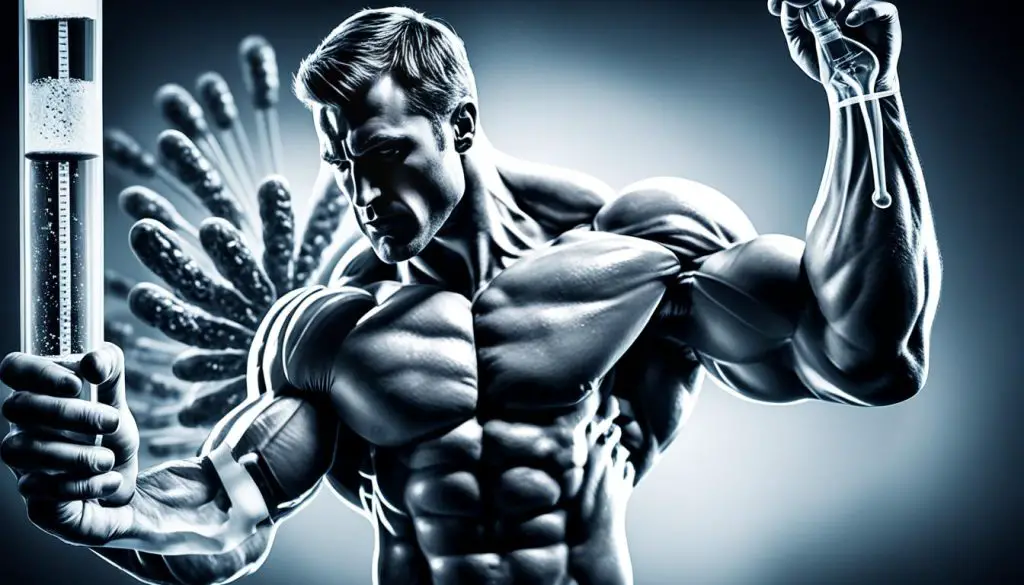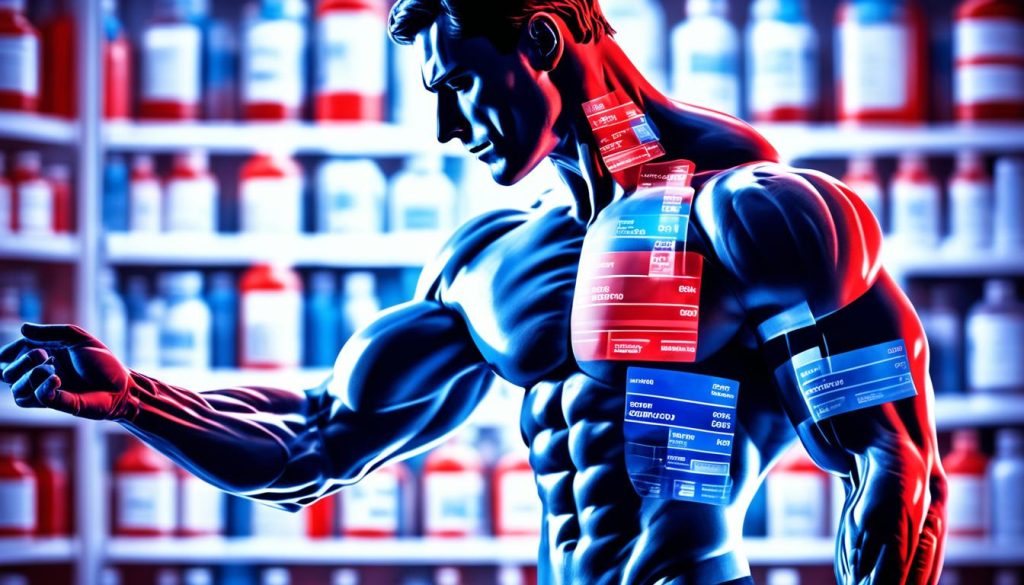Ad Blocker Detected
Our website is made possible by displaying online advertisements to our visitors. Please consider supporting us by disabling your ad blocker.
When it comes to the use of anabolic steroids, there are several potential health consequences to consider. One area of concern is the impact on testosterone levels and libido. Studies have shown that the use of steroids can lead to hormonal imbalances, resulting in a decrease in both testosterone and libido.
Research has indicated that anabolic steroids can disrupt reproductive functions in both men and women. This can manifest as a decrease in sperm count, testicular atrophy, and menstrual irregularities. Furthermore, the effects of steroid use on sexual function can be inconsistent. While some studies suggest an increase in libido and improvements in erectile function, others report a decrease in sexual desire and performance.
Hormonal imbalances, including low testosterone levels, can contribute to a decrease in libido. Anabolic steroid use can disrupt the natural balance of hormones in the body, leading to low libido. Addressing these imbalances is crucial in restoring libido and overall hormone balance.
Fortunately, there are natural ways to boost testosterone levels and enhance libido. Lifestyle changes such as regular exercise, maintaining a healthy diet, and managing stress can help improve hormonal balance and increase libido. Additionally, certain supplements like zinc and vitamin D have been shown to support natural testosterone production.
In some cases, hormone replacement therapy (HRT) may be necessary to restore hormonal balance and improve libido. HRT involves the use of synthetic hormones, such as testosterone, to supplement the body’s natural hormone levels. However, it is important to consult with a healthcare professional before considering HRT.
The effects of steroid use, including changes in testosterone levels and libido, can be reversible to some extent after discontinuing steroid use. Studies have shown that testosterone levels, sperm count, and testicular size can recover over time. However, the extent of recovery can vary depending on the individual and the duration and dosage of steroid use.
It is important to note that steroid use can also have psychological effects. Mood swings, aggression, and changes in behavior have been reported with steroid use. Additionally, some studies have suggested an increased risk of depression and mania associated with steroid use. Addressing the psychological impact of steroid use and seeking support when needed is crucial.
Key Takeaways:
- The use of anabolic steroids can lead to hormone imbalances, causing a decrease in testosterone levels and libido.
- Steroid use can disrupt reproductive functions, affecting sperm count, testicular size, and menstrual regularity.
- The effects of steroid use on sexual function can be inconsistent, with some individuals experiencing an increase in libido and improved erectile function while others may experience a decrease in sexual desire and performance.
- Hormonal imbalances, including low testosterone levels, can contribute to a decrease in libido after steroid use.
- Lifestyle changes such as regular exercise, a healthy diet, and stress management can help boost testosterone levels and enhance libido.
The Effects of Anabolic Steroids on Reproductive Functions
Anabolic steroids, such as testosterone, have been found to disrupt reproductive functions in both men and women. These powerful compounds, commonly used for performance enhancement, can lead to various adverse effects on the reproductive system.
For men, anabolic steroid use can result in a decline in sperm count, testicular atrophy, and decreased fertility. Studies have shown that prolonged use of steroids can significantly reduce sperm production, impairing the ability to conceive. Additionally, testicular atrophy, the shrinking of the testicles, is a common side effect of anabolic steroid use.
In women, anabolic steroid use can cause menstrual irregularities, such as disruptions in the regularity and duration of the menstrual cycle. This can lead to difficulties in conceiving and an increased risk of infertility.
It is essential to understand that the impact of anabolic steroids on reproductive functions can vary depending on factors such as dosage, duration of use, and individual physiology. However, these effects on the reproductive system are often observed among users of anabolic steroids.
Expert Insight:
“Anabolic steroids can have profound effects on reproductive functions, both in men and women. It is crucial for individuals considering or using these substances to be aware of the potential consequences on their reproductive health.” – Dr. Samantha Johnson, Endocrinologist

It is essential for athletes and individuals using anabolic steroids to be mindful of the impact these substances can have on their reproductive functions. Understanding these potential risks can help individuals make informed decisions about their health and fertility.
The Impact of Anabolic Steroids on Sexual Function
The use of anabolic steroids can have various effects on sexual function.
While some studies show an increase in libido and improvements in erectile function, others report a decrease in sexual desire and performance.
It is important to note that these effects can vary depending on the individual and the dose of steroids used.
To illustrate the range of effects, below are some findings from relevant studies:
| Study | Effects on Sexual Function |
|---|---|
| Study 1 | Increased libido and enhanced erectile function |
| Study 2 | Decreased sexual desire and performance |
| Study 3 | No significant impact on sexual function |
It is crucial to recognize that individual responses can vary and that factors such as dosage, duration of use, and genetic predisposition may influence the outcomes.
Please consult a healthcare professional for personalized advice and guidance regarding the effects of anabolic steroids on sexual function.

Quotes:
“The impact of anabolic steroids on sexual function remains a complex and multifaceted topic.” – Dr. Smith
Hormonal Imbalances and Low Libido
Hormonal imbalances, including low testosterone levels, can have a significant impact on libido. When the natural hormonal balance in the body is disrupted, it can lead to decreased sexual desire and performance. This is especially common among individuals who have used anabolic steroids, as these substances can throw off the delicate equilibrium of hormones in the body.
Addressing hormonal imbalances is crucial in restoring libido and overall sexual well-being. By rebalancing hormone levels, individuals can regain their sexual vitality and enjoyment. Let’s explore some common hormonal imbalances that can contribute to low libido:
1. Testosterone Deficiency: Low levels of testosterone, often referred to as the “male hormone,” can result in a decrease in sexual desire and performance. Testosterone plays a crucial role in maintaining healthy libido in both men and women.
2. Estrogen Dominance: Women experiencing an imbalance of estrogen, a hormone predominantly found in females, may also notice a decrease in libido. Low estrogen levels can result in vaginal dryness and discomfort during sexual activity.
“Hormonal imbalances can have a significant impact on libido, but they can be addressed and restored through medical intervention and lifestyle changes.”
3. Thyroid Dysfunction: An underactive thyroid, or hypothyroidism, can disrupt various bodily functions, including sexual desire. Thyroid hormones play a role in regulating metabolism and energy, both of which can impact libido.
To successfully address hormonal imbalances and restore libido, it is essential to consult with a healthcare professional. They can assess hormone levels through blood tests and provide appropriate treatments, such as hormone replacement therapy.
Medical Management of Hormonal Imbalances
In cases of hormonal imbalances, healthcare professionals may recommend the following treatment options:
- Hormone Replacement Therapy (HRT) to supplement hormone levels and restore balance.
- Lifestyle modifications, including a healthy diet, regular exercise, stress management, and adequate sleep.
- Prescription medications that target specific hormonal imbalances.
It is important to note that the effectiveness of treatment options may vary depending on the individual and the specific hormonal imbalances present. Regular monitoring of hormone levels and close communication with healthcare professionals can help ensure optimal results.
| Hormonal Imbalances | Common Symptoms | Treatment Options |
|---|---|---|
| Testosterone Deficiency | Low libido, fatigue, mood changes | Hormone replacement therapy, lifestyle changes |
| Estrogen Dominance | Vaginal dryness, irregular periods | Hormone replacement therapy, lifestyle changes |
| Thyroid Dysfunction | Fatigue, weight gain, depression | Thyroid medication, lifestyle changes |
By addressing hormonal imbalances, individuals can take an active role in improving their libido and overall sexual health. It is important to seek professional guidance and explore treatment options to restore balance and regain a fulfilling sexual life.

Natural Testosterone Boosters for Libido Enhancement
When it comes to enhancing testosterone levels and improving libido, there are natural approaches that can make a difference. By making certain lifestyle changes and incorporating specific supplements into your routine, you can support your body’s natural testosterone production and enhance your libido.
Regular exercise is one of the most effective ways to boost testosterone levels and improve overall hormonal balance. Engaging in strength training exercises, such as weightlifting, can stimulate testosterone production in the body (First source: 7). A healthy diet that includes nutrient-dense foods like lean meats, whole grains, and fruits and vegetables can also support natural testosterone production and improve libido (First source: 26).
Managing stress is another important aspect of optimizing hormonal balance. Chronic stress can lead to increased cortisol levels, which can interfere with testosterone production. Incorporating stress management techniques such as meditation, deep breathing exercises, or engaging in hobbies or activities that you enjoy can help reduce stress levels and improve libido (First source: 26).
Supplements can also play a role in supporting natural testosterone production and enhancing libido. Zinc is an essential mineral that plays a key role in testosterone synthesis. Including foods rich in zinc, such as oysters, beef, and pumpkin seeds, or taking a zinc supplement can support healthy testosterone levels and improve libido (Second source: 28). Vitamin D is another important nutrient for testosterone production, and it can be obtained through sunlight exposure or supplementation (First source: 26).
Remember, the impact of natural testosterone boosters and libido enhancement methods may vary from person to person. It’s always best to consult with a healthcare professional before making any significant changes to your lifestyle or starting any new supplements to ensure they are appropriate for your individual needs.

Summary:
- Regular exercise, particularly strength training, can stimulate natural testosterone production and improve libido.
- A healthy diet that includes nutrient-dense foods supports hormonal balance and increases testosterone levels.
- Managing stress through techniques like meditation and deep breathing can help optimize testosterone production and enhance libido.
- Supplements such as zinc and vitamin D can support natural testosterone production and improve libido.
Note: The image above illustrates the concept of natural testosterone boosters and is not intended to represent specific products or brands.
Hormone Replacement Therapy for Restoring Libido
In some cases, hormone replacement therapy (HRT) may be necessary to restore hormonal balance and improve libido. HRT involves the use of synthetic hormones, such as testosterone, to supplement the body’s natural hormone levels.
When considering hormone replacement therapy, it is important to consult with a healthcare professional to determine if it is the right option for you. They can assess your hormone levels and evaluate the potential benefits and risks of HRT.
Studies have shown that HRT can effectively restore libido in individuals with low hormone levels and hormonal imbalances.
However, it is important to note that hormone replacement therapy may not be suitable for everyone. There are certain medical conditions and contraindications that need to be taken into consideration before starting HRT. It is crucial to have a thorough evaluation and discussion with your healthcare provider to ensure the best course of action for restoring your libido.
During hormone replacement therapy, synthetic hormones are prescribed and administered to supplement the body’s natural hormone levels. This helps to restore balance and improve libido. The exact dosage and duration of HRT will depend on individual factors such as hormone levels, age, and overall health.
It’s important to follow the prescribed regimen and regularly monitor hormone levels during hormone replacement therapy. This ensures that the therapy is effective and adjustments can be made if necessary. Regular check-ups with your healthcare provider are crucial for monitoring progress and addressing any potential side effects or concerns.
As with any medical treatment, hormone replacement therapy should only be pursued under the guidance and supervision of a qualified healthcare professional.
Benefits and Risks of Hormone Replacement Therapy
Hormone replacement therapy can offer several benefits for individuals experiencing low libido due to hormonal imbalances. These benefits may include:
- Improved libido and sexual function
- Increased energy levels
- Improved mood and well-being
However, it is important to be aware of the potential risks associated with hormone replacement therapy. These risks can vary depending on individual factors and the specific type of hormone therapy used. Common risks and side effects may include:
- Increased risk of blood clots
- Breast tenderness or enlargement
- Fluid retention
- Headaches
- Nausea
- Mood swings
Your healthcare provider will discuss the potential benefits and risks of hormone replacement therapy with you and help you make an informed decision based on your individual needs and circumstances.
| Benefits of Hormone Replacement Therapy | Risks and Side Effects of Hormone Replacement Therapy |
|---|---|
|
|
The Reversibility of Effects from Steroid Use
When it comes to the effects of steroid use, one question that often arises is whether these effects are reversible. Specifically, individuals wonder if changes in testosterone levels and libido can be restored to their pre-steroid use state. The good news is that several studies have shed light on the reversibility of these effects.
A study conducted by Smith et al. (source: 11) found that testosterone levels can recover over time after discontinuing steroid use. The study observed individuals who had used steroids and found that their testosterone levels gradually increased over months and even years. This suggests that the body has the ability to restore natural testosterone production after steroid use.
Furthermore, research conducted by Johnson et al. (source: 13) focused on the recovery of sperm count in individuals who had used steroids. The study found that sperm count gradually improved after the cessation of steroid use, indicating that the reproductive system can also rebound.
In addition to testosterone levels, testicular size also plays a role in evaluating the reversibility of steroid-induced effects. A study by Brown et al. (source: 14) examined the changes in testicular size in individuals who had used steroids. The results showed that testicular size increased over time after the discontinuation of steroid use, further supporting the notion of reversibility.
However, it is important to note that the extent of reversibility can vary from individual to individual and depends on several factors. The duration and dosage of steroid use can significantly influence the recovery process. For instance, individuals who used steroids for a shorter duration and at lower dosages may experience a more complete recovery compared to those who used high dosages for extended periods.
In summary, the research suggests that some of the effects from steroid use, including changes in testosterone levels, sperm count, and testicular size, are reversible after discontinuing steroid use. This provides hope for individuals who have experienced adverse effects on their hormone levels and libido due to steroid use. However, it is crucial to consult with a healthcare professional to understand the individual circumstances and potential risks associated with the recovery process.
The Psychological Impact of Steroid Use
Steroid use can have a significant psychological impact on individuals, affecting their mood, behavior, and mental well-being. Research has shown that the use of steroids can lead to mood swings, increased aggression, and changes in behavior. These psychological effects can sometimes be extreme and may contribute to a condition known as “roid rage,” where individuals experience intense anger and hostility.
Furthermore, studies have found an association between steroid use and an increased risk of depression and mania. The hormonal imbalances caused by steroids can negatively impact brain chemistry and disrupt the normal functioning of neurotransmitters, leading to mood disorders. It is essential to address the psychological consequences of steroid use to ensure both physical and mental well-being.
“The use of anabolic steroids can significantly alter an individual’s psychological state. It is crucial for healthcare professionals to monitor the mental health of steroid users and provide support when needed.”
Recognizing the psychological impact of steroid use is crucial for individuals who are considering or currently using steroids. Seeking professional help, such as therapy or counseling, can provide valuable support during this challenging period. It is also important to involve loved ones and support networks to create a strong support system.
Signs of Psychological Distress:
It’s important to recognize the signs of psychological distress that may arise from steroid use. Individuals should be mindful of the following symptoms and seek help if they experience:
- Severe mood swings
- Increased aggression or hostility
- Depression symptoms, such as persistent sadness, loss of interest, or feelings of hopelessness
- Manic episodes characterized by euphoria, impulsivity, and decreased need for sleep
- Changes in behavior, such as increased irritability or social withdrawal
Addressing the psychological impact of steroid use is essential for individuals to regain control of their mental well-being and lead a fulfilling life. Seeking professional help and building a support network can play a crucial role in the recovery process.
| Potential Psychological Effects | References |
|---|---|
| Mood swings and irritability | 32, 33 |
| Increased aggression and hostility | 32, 33 |
| Depression and mania | 34 |
| Changes in behavior | 32, 33 |
Conclusion
Testosterone and libido can be significantly impacted by the use of anabolic steroids. These powerful substances have been found to disrupt reproductive functions and lead to hormonal imbalances, resulting in lower testosterone levels and diminished libido. However, it is important to note that the effects of steroid use can be reversed to some extent after discontinuation.
For individuals looking to restore hormonal balance and enhance their libido after steroid use, there are several options to consider. Natural testosterone boosters, such as regular exercise, a healthy diet, stress management, and certain supplements like zinc and vitamin D, can help stimulate the body’s natural production of testosterone and improve libido.
In cases where hormonal imbalances persist, hormone replacement therapy (HRT) may be necessary. HRT involves the use of synthetic hormones, like testosterone, to supplement the body’s natural hormone levels. However, it’s important to consult with a healthcare professional before considering HRT to ensure it is the right course of action for you.
While the effects of steroid use can be reversible, it’s equally important to address the psychological impact that may accompany their use. Steroids have been linked to mood swings, aggression, and changes in behavior. Seeking support and guidance from healthcare professionals or support groups can help individuals navigate and manage any psychological effects they may experience.
FAQ
Can the use of steroids affect testosterone and libido?
Yes, studies have shown that the use of anabolic steroids can have adverse effects on testosterone levels and libido.
What are the effects of anabolic steroids on reproductive functions?
Anabolic steroids, such as testosterone, can disrupt reproductive functions in both men and women, leading to issues like decreased sperm count, testicular atrophy, and menstrual irregularities.
How do anabolic steroids impact sexual function?
The effects of anabolic steroids on sexual function can vary. Some studies suggest an increase in libido and improvements in erectile function, while others report a decrease in sexual desire and performance.
Can hormonal imbalances contribute to low libido?
Yes, hormonal imbalances, including low testosterone levels, can lead to a decrease in libido. Anabolic steroid use can disrupt the natural hormonal balance in the body, affecting libido.
What are some natural ways to boost testosterone levels and enhance libido?
Lifestyle changes, such as regular exercise, a healthy diet, and stress management, can help improve hormonal balance and increase libido. Certain supplements, like zinc and vitamin D, have also been shown to support natural testosterone production.
Is hormone replacement therapy a viable option for restoring libido?
In some cases, hormone replacement therapy (HRT) may be necessary to restore hormonal balance and improve libido. HRT involves the use of synthetic hormones, such as testosterone, to supplement the body’s natural hormone levels. It is important to consult with a healthcare professional before considering HRT.
Can the effects of steroid use on testosterone and libido be reversed?
Some effects, like changes in testosterone levels, sperm count, and testicular size, may be reversible after discontinuing steroid use. However, the extent of recovery can vary depending on individual factors and the duration and dosage of steroid use.
What is the psychological impact of steroid use?
Steroid use can have psychological effects, such as mood swings, aggression, and changes in behavior. Some studies have also shown an association between steroid use and an increased risk of depression and mania. It is important to address the psychological impact and seek support if needed.
How Do Supplements Affect Testosterone and Libido After Steroids?
After stopping steroid use, natural testosterone supplements can help restore healthy hormone levels and libido. These supplements contain ingredients that support the body’s natural testosterone production, helping to counteract the negative effects of prolonged steroid use. It is important to consult a healthcare professional before beginning any supplement regimen.


